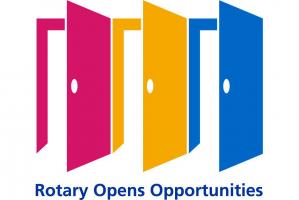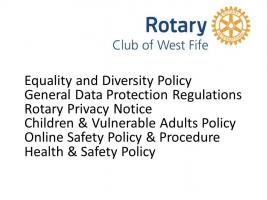A Day in the Life of a Logistics Manager
Tue, Oct 14th 2025 at 6:30 pm - 8:30 pm
Speaker was Iain Little

Inside a 24/7 Industry
Recently retired Transport Manager Iain Little shared fascinating insights into his 40-year career with the Rotary Club of West Fife, revealing the demanding nature and vital importance of an industry that touches every aspect of our daily lives.
A Round-the-Clock Commitment
"For a transport manager, you are basically 24/7, 365," Iain explained. With vehicles on the road six days a week in his last position, the only respite came during the brief period between Christmas and New Year. Even from home in the evening, Iain would monitor drivers on his iPad as they returned to the Perth depot between 7pm and 9pm, ensuring their safety when handling theft-attractive goods in dark industrial estates.
The job demands constant vigilance. Each morning begins with checking the location of vehicles and any overnight incidents, particularly when managing 12 trucks running nightly trunking routes to Birmingham and back.
From Manufacturing to Just-in-Time
Iain witnessed dramatic changes across four decades in the industry. He started when the UK still manufactured goods domestically, working at Scottish Agricultural Industries in Leith, which produced 40,000 tonnes of fertiliser annually. In those days, everything was manual - planning with tickets and organising complex double-loading operations during harvest time without computers.
The introduction of technology brought both benefits and complications. Route planning software, computers, and various tracking systems transformed operations, though Iain noted that at its heart, "all transport does is it picks something up, and it delivers it. That's the simplicity of it."
The modern "just-in-time" culture means planning now happens the same morning as deliveries, rather than the previous day as in earlier times.
Technology and Compliance
The evolution of tachographs illustrates how regulation has tightened. Original analogue tachographs - circular cardboard discs - were easily manipulated by drivers. These gave way to digital cards that record everything a driver does, eliminating opportunities for fraud.
Current UK regulations require drivers to take a 45-minute break within any nine-hour driving period, preferably after four and a half hours of driving. Modern telematics systems like Samsara now provide comprehensive monitoring with multiple cameras, track-and-trace capability, and automatic incident recording. These systems prove invaluable for accident prevention and managing insurance costs.
Driver Welfare: An Overlooked Crisis
Iain highlighted serious concerns about driver welfare, particularly for long-distance "tramping" drivers who leave Monday and return Friday. "The facilities for these drivers in the UK are terrible," he stated bluntly. Drivers often must park overnight in lay-bys on motorways like the M6 because services are full, with insufficient secure parking nationwide.
Mental health and wellbeing have become increasingly important considerations, especially as transport managers balance operational demands with their duty of care responsibilities.
The Language of Logistics
The industry has developed extensive jargon that Iain demystified. Regional Distribution Centres (RDCs) serve as major hubs, with most UK centres located in the Birmingham-Leicester corridor at sites like Magna Park - a three to four square mile industrial complex that ironically lacks a single driver facility.
Forward Stocking Locations (FSLs) operate as satellite depots fed from RDCs. Third-party logistics involves multiple companies in the delivery chain. "Supply chain" has become the professional term for what Iain still calls transport - "because I'm old school."
The rise of Amazon has popularised "fulfilment centres" for pick-and-pack operations, with seven now operating across the UK. Smart lockers, which Iain first encountered in 2003, are growing as a delivery solution, though he emphasised that heavy goods vehicles remain essential to move goods between all these points.
Urban Delivery Challenges
City centres present particular difficulties. Delivery restrictions - such as Edinburgh's Rose Street only allowing deliveries before 10am - create impossible demands. "We cannot be everywhere," Iain stressed, noting the inflexibility of traffic wardens nationwide.
He proposed solutions like Sheffield's Meadowhall Shopping Centre, which operates a nearby RDC serving all shops with small vans only, eliminating large vehicles from the centre entirely while freeing up retail space. He suggested Dunfermline could implement similar regional distribution centres for local businesses.
The Bottom Line
Iain concluded with a fundamental truth: "Without the driver, you may not be able to put food on the table, fill up your car and have a social life." Whether called transport, supply chain, or logistics, the industry remains critical to modern life.
The transport manager's role involves managing customer expectations, controlling costs, ensuring legal compliance in one of the UK's most heavily regulated industries, and above all, taking ultimate responsibility when things go wrong. "Buck stops with the transport manager," Iain said simply.
As Iain reminded the Club, despite university degrees in logistics and supply chain management producing graduates fluent in industry buzzwords, the fundamental job remains unchanged: moving goods from A to B - even if they sometimes have to go via Z, Y, and X to get there.
The Club's vote of thanks was given by Roger Templeton.
'What We Do' Main Pages:

Information and application form. Scroll down to see who has benefited from our grants programme.
more
Primary Schools linked to Rotary Club of West Fife:- Blairhall, Cairneyhill, Carnock, Crossford, Camdean, Culross, Inzievar, Holy Name, Limekilns, Milesmark, St Serfs, Saline, Torryburn, Tulliallan. Secondary Schools:- Queen Anne and Woodmill
moreOiling the West Fife Club's Rotary wheel
more
The club has a varied and interesting sports programme incorporated under the Entertainment Programme. .
morePaul Harris Fellowship Awardees
more








